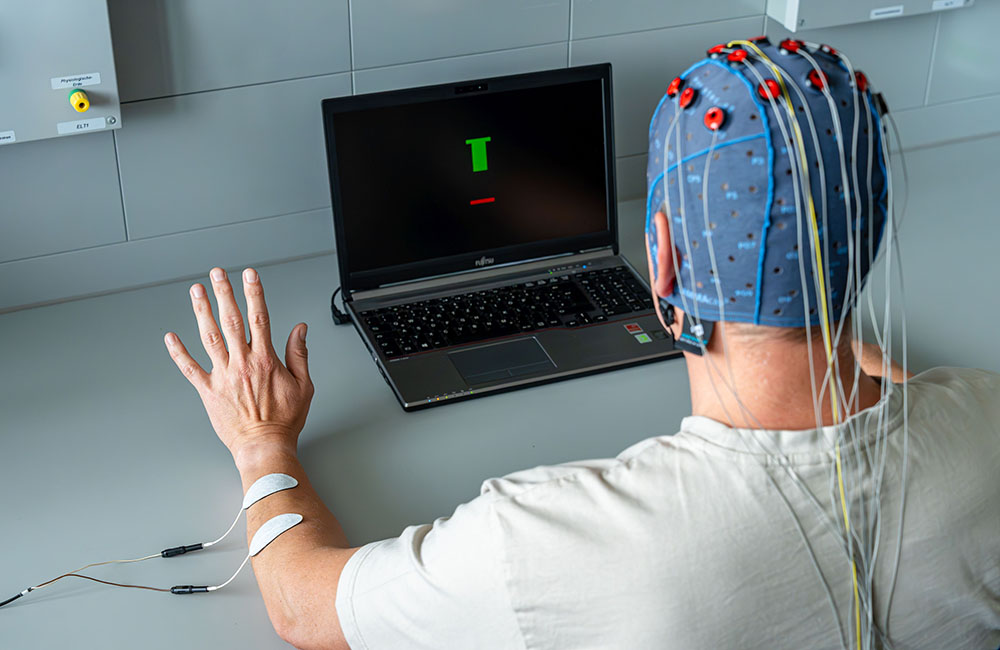Better recovery after stroke: early combination therapy makes the difference
A new study by Magdeburg University Hospital shows that early brain activity-guided therapy can significantly improve arm mobility after a stroke.
One-sided paralysis after a stroke often has a significant impact on patients' quality of life. The limited mobility of the affected arm is a particular burden in everyday life. Early use of a special combination therapy consisting of brain signal recognition and electrical muscle stimulation can significantly improve the recovery of arm mobility after a stroke. This is the conclusion reached by the research team led by Prof Dr Catherine Sweeney-Reed, head of the Neurocybernetics and Rehabilitation working group at the Department of Neurology at Otto von Guericke University Magdeburg. The results of the study have now been published in the journal Scientific Reports and open up new avenues in stroke rehabilitation.
More than 75 per cent of stroke patients experience considerable restrictions in arm mobility. The study investigated an innovative treatment that combines two modern techniques: the brain-computer interface (BCI) and functional electrical stimulation (FES).
- BCI: This technology records brain signals and translates them into commands that are executed by a device. This allows the brain to communicate directly with a computer or machine.
- FES: This method uses electrical impulses to stimulate muscles and trigger movements.

Photo: In a study at Magdeburg University Hospital, researchers investigated a therapy that combines a brain-computer interface (BCI) with functional electrical stimulation (FES). In the picture, the BCI system controls the FES, which sends targeted electrical impulses to a participant's muscles to synchronise movements with their own brain activity and thus promote the recovery of arm muscles after a stroke. Photographer: Robin Ritter/LIN
In the study, the BCI system monitored brain activity and targeted the FES device, which sent electrical impulses to the participants' muscles to support movement and promote recovery. Participants were divided into two groups: one received BCI-FES therapy, where stimulation was delivered at the same time as the movement attempt detected in the brain signals, while the control group received stimulation at random times. The study included people in both the acute (less than 1 month) and subacute phases (1-6 months) after a stroke.
‘Our results suggest that an early start with BCI-FES can significantly improve motor recovery after a stroke. The decisive factor here is whether the time of detection of a movement attempt in the brain is synchronised with the start of muscle stimulation. If both occur almost simultaneously, the restoration of the connection between brain signals and movements is supported,’ explains Sweeney-Reed. In addition, electrophysiological measurements also provided evidence that BCI-FES therapy restores the functional connection between brain activity and muscle movement. ‘This is an important step towards targeted and effective rehabilitation therapy,’ emphasises Sweeney-Reed. ‘Starting this therapy early is often challenging as patients undergo many other treatments after a stroke. Nevertheless, BCI-FES therapy offers great opportunities, especially for patients with severe paralysis of the arm muscles,’ adds the neuroscientist.
The results of this study lay the foundation for further research and the development of new therapeutic approaches that can sustainably improve the quality of life of those affected.
Project partners
The research project was carried out in close collaboration with renowned national and international partners, including the Universities of Dallas and Berkeley in the USA and the Universities of Essex and Reading in the UK. The therapy was carried out at the MEDIAN Neurorehabilitation Centre in Magdeburg.
Original publication
Scientific contacts
Study director: Prof Dr Catherine M. Sweeney-Reed, Head of the Neurocybernetics and Rehabilitation working group at the Department of Neurology, Otto von Guericke University Magdeburg, phone: +49 391 67 28224, email: catherine.sweeney-reed@med.ovgu.de






